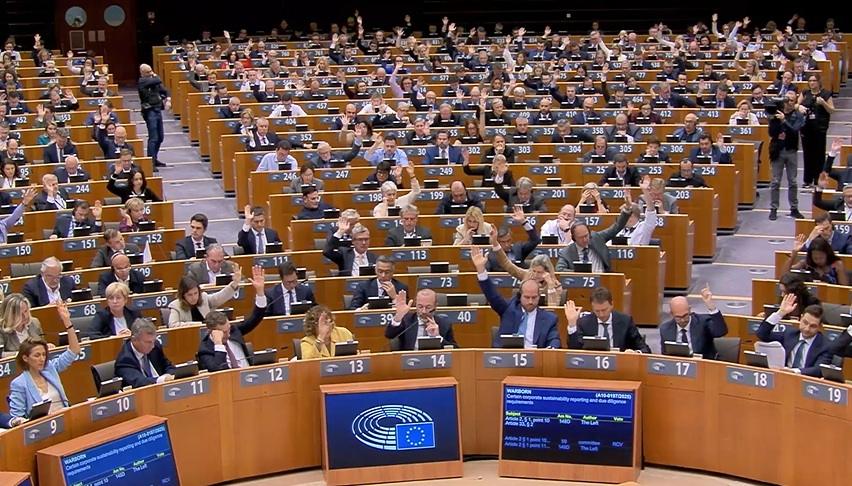Lawmakers in the European Parliament agreed today to dramatically cuts to the EU’s sustainability reporting and due diligence laws, including significant reductions in the number of companies covered by the Corporate Sustainability Reporting Directive (CSRD) and Corporate Sustainability Due Diligence Directive (CSDDD), and the elimination of the obligation by companies to prepare climate transition plans.
The vote, with 382 MEPs in favor and 249 opposed, follows the rejection last month by lawmakers of a compromise deal on the European Commission’s Omnibus I initiative, which would have seen less significant changes to the sustainability regulations, leading the European People’s Party (EPP) turning instead to farther-right parties to form Parliament’s official negotiating position.

The Omnibus package was released by the Commission in February as part of its simplification agenda to boost European competitiveness and reduce compliance burdens on companies, proposing a wide-ranging series of changes to regulations including the Corporate Sustainability Reporting Directive (CSRD), the CSDDD, the Taxonomy Regulation, and the Carbon Border Adjustment Mechanism (CBAM).
The Commission’s initial proposal would have reduced the number of companies covered by the CSRD by approximately 80% by moving the regulation to cover only companies with more than 1,000 employees from the current 250 employee threshold, while retaining the CSDDD’s 1,000 employee threshold, in addition to shifting due diligence requirements to focus primarily at the level of direct business partners, unless the company has plausible information of adverse impacts further down the value chain. The initiative also introduced limits to the amount of information that could be requested from smaller value chain companies.
In negotiations in Parliament, however, lawmakers had been sharply divided on the direction of Parliament’s position, with left-leaning parties pushing for smaller cuts to the regulations, farther-right parties looking to scrap the CSRD and CSDDD altogether.
In October, after the EPP threatened to align with farther-right parties, left and center parties agreed to a “compromise” package with the EPP, which retained the CSRD’s 1,000 employee scope, but added a €450 million revenue threshold, while dramatically increasing the threshold of the CSDDD to cover only companies with 5,000 employees and more than €1.5 billion in revenues. The compromise position was narrowly defeated in a 309-318 vote, with Omnibus rapporteur Jörgen Warborn of the EPP blaming the center-left parties’ MEPs for failing to support the deal.
Parliament’s new position aligns with the one initially proposed by the EPP’s October deal with the farther-right parties. The position dramatically reduces the number of companies covered by the CSRD with a new threshold of 1,750 employees and €450 million in revenues, and leaves only the largest companies within the scope of the CSDDD, with a threshold of 5,000 employees and revenues of over €1.5 billion.
Companies below the scope will be protected from requests by companies for information greater than that set out in voluntary sustainability reporting standards. Additionally, companies covered by the CSDDD are directed to rely on information that is already available, instead of systematically requesting information from smaller value chain companies, and to only request additional information from their smaller business partners as a last resort.
Parliament’s adopted position also eliminates the need for companies to prepare a transition plan to make their business model compatible with the Paris Agreement, and shifts liability for non-compliance with due diligence requirements to the national level, instead of the EU level.
Sustainable investment groups sharply criticized the vote, with Richard Gardiner, Interim Head of EU Policy at ShareAction saying that it “risks not only gutting the impact of landmark laws like the CSDDD and CSRD but drives a stake through the heart of Europe’s wider sustainability agenda.”
Gardiner added:
“What we’re witnessing isn’t just a watering down of ambition, but a public alliance of political forces fundamentally opposed to sustainability itself.”
Parliament’s new position also sets it farther from that adopted in June by the EU Council, which had aligned more closely with the recently-rejected compromise deal. Negotiations between the Parliament and Council are scheduled to begin next week, with the aim of finalizing the legislation by the end of the year.
Omnibus rapporteur Jörgen Warborn said:
“Today’s vote shows that Europe can be both sustainable and competitive. We are simplifying rules, cutting costs, and giving businesses the clarity they need to grow, invest, and create well-paying jobs.”

